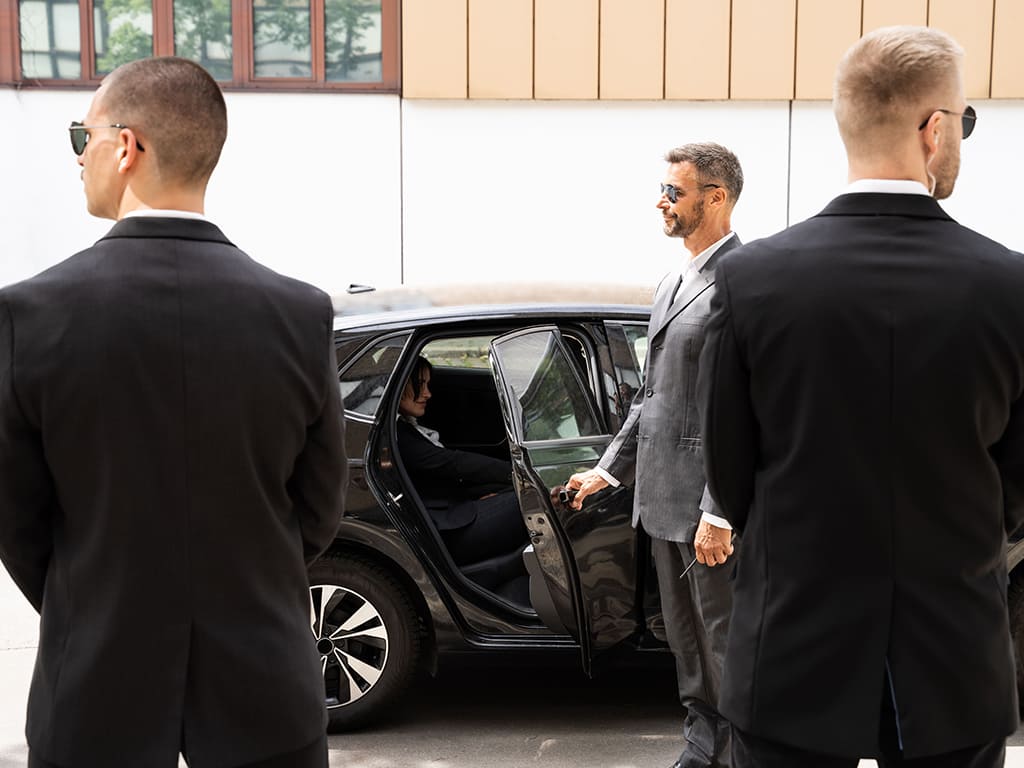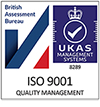When you hear the phrase “close protection security,” you might think of bodyguards escorting celebrities on red carpets or protecting world leaders on international trips. While this image isn’t wrong, close protection security goes much deeper.
It’s about safeguarding individuals from potential harm, providing peace of mind, and ensuring that their lives and businesses can proceed smoothly without interruptions from external threats.
Close protection is becoming increasingly vital in a world where risks like personal attacks, intrusive fans, and geopolitical tensions are a reality. For High Net Worth Individuals (HNWIs), corporate executives, and celebrities, having expert close protection is not just a luxury—it’s a necessity.
What is close protection security?

Close protection security, often referred to as bodyguard services, is a specialised field of personal security that focuses on physical protection and risk mitigation for individuals at risk of harm. It goes beyond simple guarding duties to include preemptive security measures, comprehensive planning, and expert execution in a wide variety of scenarios.
Close protection officers (CPOs) are highly trained specialists within the private security industry, tasked with ensuring their client’s safety, privacy, and overall security. Their role may include mitigating threats like harassment, physical attacks, kidnapping, or even assassination attempts in extreme cases. These officers often work covertly or visibly, depending on the demands of their clients.
Close protection services are tailored to meet the unique needs of each client. Whether it’s escorting a CEO to a high-stakes board meeting or accompanying a celebrity to a public event, the goal is to maintain normalcy in the client’s life while ensuring their security.
Who needs close protection security?

Close protection isn’t just for Hollywood stars or royalty; it’s for anyone whose prominence or lifestyle makes them a target for harm or undue attention. Here are some common profiles of people who benefit from close protection services:
HNWIs and their families
Wealth often brings unwanted attention and can make individuals more vulnerable to threats like extortion or unwanted surveillance.
Politicians and diplomats
Those in government or politics face elevated risks from organised opposition, political rivals, or activists.
Celebrities
Whether they’re in the worlds of music, film, sports, or television, public figures often require protection from over-enthusiastic fans, paparazzi, or stalkers.
Corporate executives
CEOs and prominent business leaders may face risks related to industrial espionage, disgruntled employees, or financial crimes.
Journalists and legal professionals
Those working on high-profile cases or covering controversial topics may need protection from targeted violence or harassment.
VIP event attendees
High-profile gatherings can attract unwanted attention, making short-term protection essential.
If you fit into one of these categories—or suspect you could—close protection could provide the peace of mind needed to live and work securely.
What types of threats do close protection officers handle?

Close protection officers are trained to handle a variety of threats, many of which stem from the unique profile and activities of their clients. These could include:
- Over-enthusiastic fans or stalkers – Public figures often face unsolicited contact or harassment from individuals seeking personal interaction.
- Direct or indirect threats – These may range from verbal threats received online to tangible risks posed by organised groups.
- Privacy invasions – Discreet surveillance or paparazzi activity can lead to compromised safety and security.
- Political or business rivals – Opponents may resort to underhanded tactics to disrupt an individual’s life or work.
- Terrorism and organised crime – High-profile figures and their families may become targets for kidnapping, extortion, or violence.
By carefully assessing these risks, close protection officers can pre-empt potential threats and ensure their clients’ safety.
Roles and responsibilities of a close protection operative
What exactly does a close protection officer do? This role involves a wide range of responsibilities that extend far beyond the stereotypes portrayed in movies. Tasks include:
- Physical security – The first and most visible role is to provide physical protection from harm. This includes personal protection officers shielding clients from assaults, harassment, or potential attacks.
- Preemptive security planning – CPOs meticulously assess venues and environments in advance, identifying vulnerabilities, escape routes, and potential risks to ensure robust security.
- Travel security – Escorting clients during travel is a significant aspect of the job. Officers conduct vehicle checks, plan secure routes, and provide tactical driving skills to handle emergencies on the move.
- Risk assessments – CPOs conduct continuous risk evaluations and adjust security protocols as needed to match evolving threats.
- Emergency readiness – Beyond physical protection, close protection officers are also trained in first aid, ready to address medical emergencies when required.
- Venue security – When clients attend events, close protection officers oversee venue security and manage access control to mitigate risks.
- Intelligence gathering – CPOs gather intelligence from various sources and use it to identify any perceived threat(s) in advance.
How are close protection services different from regular security?
It’s essential to distinguish between close protection security and general security services such as static guards or CCTV operators. Standard security roles focus on protecting physical spaces like office buildings or retail stores, while close protection is highly individualised.
Key differences include:
- Personal focus – Close protection officers protect people, not buildings or properties, which demands a more dynamic and versatile skill set.
- Advanced training – Close protection requires a higher level of training, covering areas like conflict management, tactical driving, and surveillance awareness.
- 24/7 availability – Unlike standard security jobs, close protection is a round-the-clock commitment, often requiring officers to stay with their clients for extended periods.
- Customised approach – Each client has unique needs, and close protection officers tailor their services to provide bespoke security solutions.
Additionally, whilst it is routine for security professionals to be registered with and accredited by the security industry authority (SIA), a close protection team will not only have this basic qualification, but will also possess a set of specialist skills acquired from intensive close protection training.
How much does close personal protection security cost in the UK?
The cost of close protection security can vary widely based on several factors, including the level of risk, the amount of coverage required, and any additional services needed (e.g., travel security).
Typically, close protection services in the UK range from £500 to £1,500 per day per officer, with more complex assignments requiring specialised teams and incurring additional costs. While this might seem steep, the value of peace of mind and expert protection is priceless.
Specialist providers like MEC Security offer customised packages to meet diverse needs, ensuring clients only pay for the services that are essential to their safety and comfort.
Why close protection security might be right for you
If you’re a high-profile individual, executive, or celebrity concerned about safety, close protection security isn’t just an added layer of convenience—it’s your assurance of personal safety. Whether it’s shielding against physical threats or simply enabling you to move through daily life with fewer worries, investing in an expert team of close protection officers can transform the way you live and work.
Take the next step towards safety and security
At MEC Security, we’re renowned in the close protection industry for our specialism in creating bespoke close protection solutions tailored to your unique needs. With a team of expertly trained officers and a commitment to discretion and professionalism, we make sure you’re protected at every step.
Whether you’re looking for short-term event security or long-term close protection, MEC Security offers comprehensive close protection services to fulfil any security requirement.
Contact us today for a confidential consultation and explore how our tailored services can provide peace of mind where it matters most.

 Call us:
Call us:
 Email us:
Email us:








